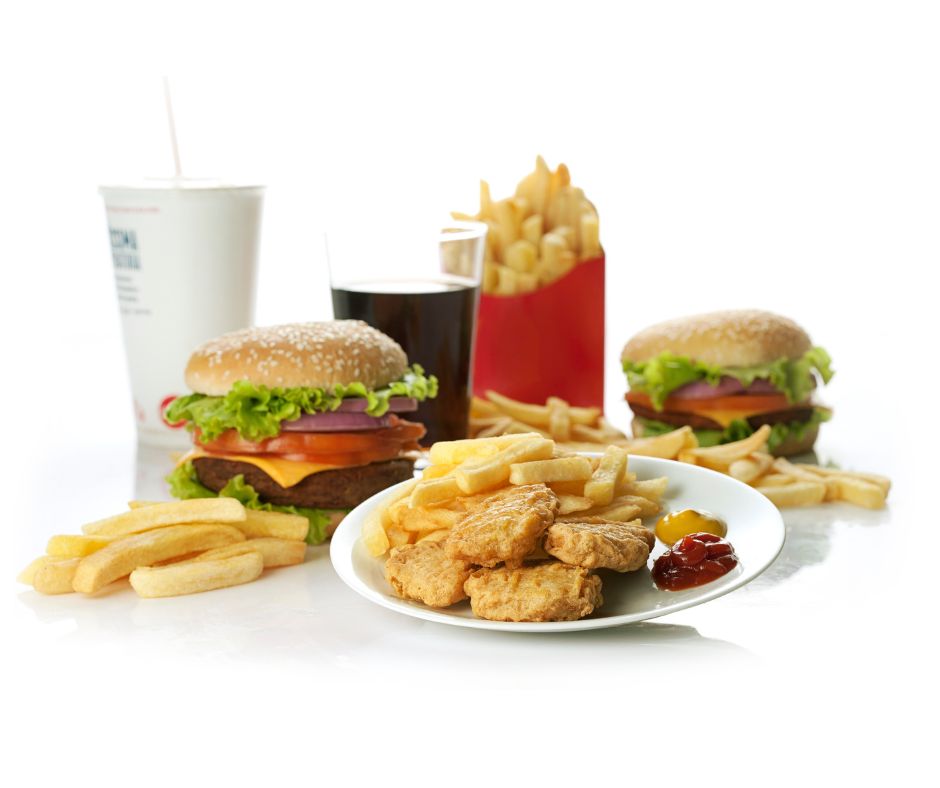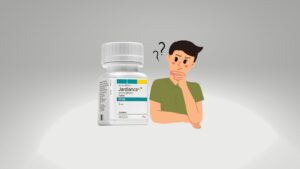Alright, let’s talk about food. Now, this is an interesting topic. Individuals who struggle with obesity are constantly told if they would just stop eating so much, they wouldn’t have obesity. Or, they are often faced with comments like, “Fat people just need to stop stuffing their face. Obesity is not a disease.”– a direct quote from a TikToker who commented on one of my recent posts. To that angry little human, who clearly needs a hug: nobody needs to care about that opinion.
The reality of the matter is that obesity is much more complicated than just ‘eating less.’ For today’s topic, we will temporarily put aside the whole part of obesity where genetics, physiology, learned behaviours, and environment all play a monumental role in its development. Today, we are just going to talk about food, particularly ultra-processed foods and their role in obesity development.
So what are ultra-processed foods?
Essentially, all food that eventually ends up at the grocery store has undergone some degree of processing. Grains have been grounded to flour to make bread. Meats have been butchered and separated, and even the fresh veggies have been picked, washed (I do recommend rewashing), and packaged neatly so that you will buy them. These would all be considered minimally or unprocessed foods.

On the other hand, ultra-processed foods are defined as ‘formulations mostly of cheap industrial sources of dietary energy and nutrients plus additives, using a series of processes.’ (Side note: I laughed at the ‘series of processes’ part as that seemed obvious.) They are heavily processed foods that contain minimal whole foods.
I often think of Pringles chips in this case. With Pringles, I have never known where the potato ends and the chemicals start. I used to eat them until my lips were cut and my yearly salt intake had been exceeded in one sitting.
Here are some other examples to help clarify: food with ingredients including hydrogenated oils, high-fructose corn syrup, flavouring agents, and emulsifiers — foods such as potato chips, sugar-sweetened drinks, processed meats and French fries. In comparison, unprocessed foods are plant foods like vegetables, fruits, nuts, whole grains, legumes, milk, eggs, fish and meat.
Essentially every health organization across the globe advises people to avoid ultra-processed foods. However, this is easier said than done. Ultra-processed foods tend to be cheap, have a long shelf life, are safe from a microbiological perspective, provide important nutrients, and are convenient — i.e. you can eat it as is or nuke it, and bam, you have dinner.
Does anyone remember eating POGO™ dogs and Pizza Pops™? Aww… the nostalgia of childhood. (Just as an FYI to any of the bachelors or bachelorettes reading this making Mac’n’Cheese with cut-up hot dogs is apparently not a way to impress a date… reason #58 why I am still single.)
Interestingly, the rise of obesity and type 2 diabetes has occurred in parallel with an increasingly industrialized food system! In fact, ultra-processed foods constitute the majority of calories consumed in America and have been associated with poorer health outcomes and even death. Moreso, it is thought that may facilitate overeating and the development of obesity!
Why do ultra-processed foods get a bad rap?
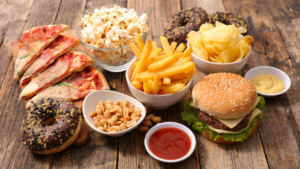 Ultra-processed foods are generally packed full of calories, salt, fat, and sugar – basically, everything that leads to happiness. On top of that, the food industry has spent BILLIONS of dollars to engineer their foods to be as delicious as possible.
Ultra-processed foods are generally packed full of calories, salt, fat, and sugar – basically, everything that leads to happiness. On top of that, the food industry has spent BILLIONS of dollars to engineer their foods to be as delicious as possible.
Everything from the way the wrapping sounds and feels while opening up your favourite piece of chocolate, to having the perfect melting point once the chocolate is in your mouth, to the delightful after taste that lingers just long enough to make you want to have another piece. Anyone else turned on? I have a mad craving for chocolate now.
Essentially, these companies have found the perfect formulation of salt, sugar, fat, texture, smell, feel, and taste to cause a literal orgasm in your mouth. The reward centre of your brain lights up like Al Pacino’s did when he buried his head in a pile of cocaine. So, it makes sense that ultra-processed foods may lead to one overeating and may also be linked to the development of obesity!
What does the science say about ultra-processed foods?
Well, one of my favourite researchers, Dr. Kevin Hall and friends, looked into answering that very question! They brought 20 adult participants, ten males and ten females (Age ~31; BMI ~27.1), to be inpatients at the Metabolic Clinical Research Unit at the National Institute of Health for a continuous 28-day period.
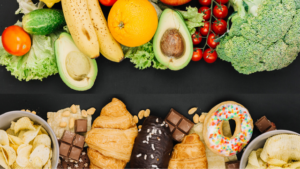 The participants were randomly assigned to consume an ultra-processed or unprocessed diet for two weeks, followed immediately by switching to the alternate diet they didn’t have previously. During each phase the participants were provided with three meals a day and were instructed to consume as much or as little food as they wanted. They were also provided snacks and water throughout the day as well.
The participants were randomly assigned to consume an ultra-processed or unprocessed diet for two weeks, followed immediately by switching to the alternate diet they didn’t have previously. During each phase the participants were provided with three meals a day and were instructed to consume as much or as little food as they wanted. They were also provided snacks and water throughout the day as well.
Their first finding was the weekly cost of 2000cal/day for ultra-processed meals was $106 vs. $151 per week for unprocessed meals. Again, it is expensive to eat healthy. In terms of food intake, individuals on the ultra-processed food regimen consumed ~500cal/day more than the unprocessed food regimen. The extra calories that were consumed tended to be carbohydrates and fat, but not protein!
All participants reported similar pleasantness, and familiarity between the diets and there were no differences in subjective appetitive properties. On top of that, the individuals consuming ultra-processed food seemed to consume the food at a faster rate.
Over the course of the two weeks, individuals in the ultra-processed diet group gained nearly 1kg and those in the unprocessed diet group lost nearly 1kg.
Here is a nice graphical summary from the study and two breakfast examples (bagel with cream cheese and turkey bacon vs. oatmeal, bananas, walnuts and skim milk):
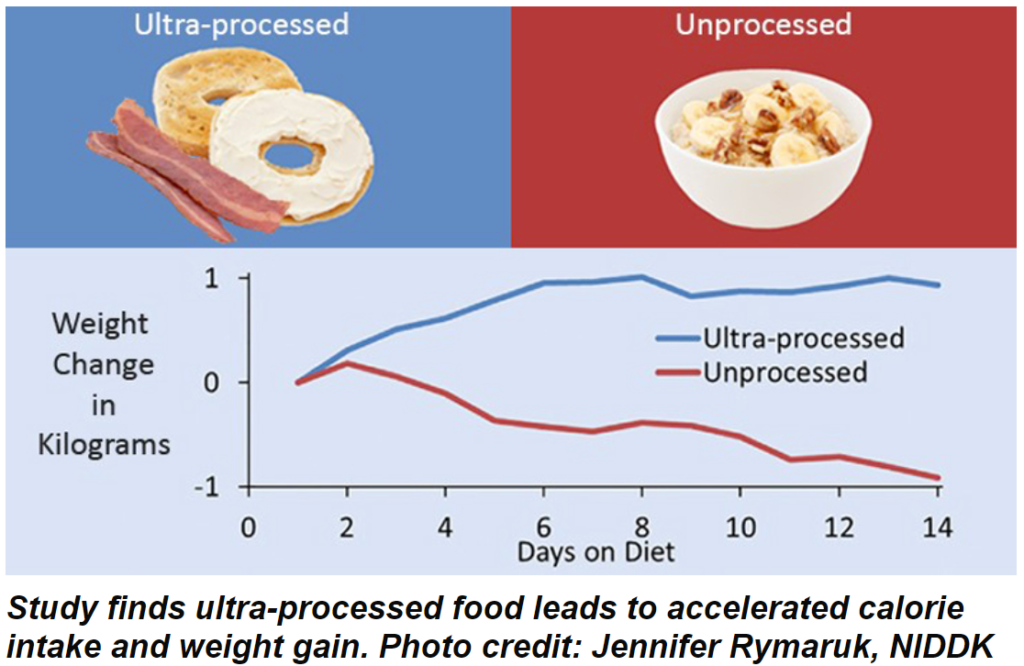
Final Thoughts
So, ultra-processed foods may certainly be a contributing factor to the obesity epidemic. In particular, for those from a lower socioeconomic status. One of the first steps I work on with my clients is reducing their intake of processed foods. FYI to all the diet zealots out there: that is essentially what every diet on the planet promotes.
Does it mean you need to cut ultra-processed food out altogether? Hell no! Ultra-processed food is designed to be and is delicious. If someone tries to take away my french fries, burgers, pizza, or chocolate, I will cut them or, more likely, throw a tantrum. However, should we aim to have less processed foods? Absolutely! Anytime you can prepare meals at home with fresh ingredients (even including more processed foods), the healthier it is going to be for you and will likely aid in your weight-management efforts.

